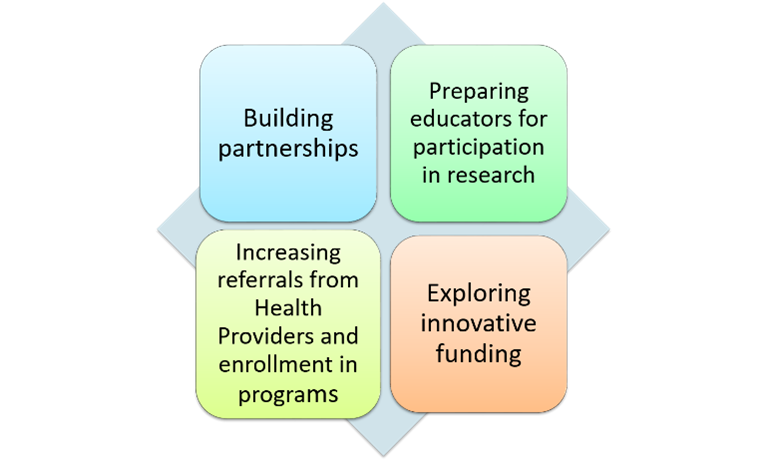About the Michigan State University Model of Health Extension
What started as a partnership between the MSU College of Human Medicine and Michigan State University Extension from 2008 to 2017 is now serving as a national model of how Cooperative Extension can collaborate with medical schools and faculty to increase health research and strengthen primary care delivery to patients. This effort was originally called “Extension Health Research” at MSU Extension.
Today, “Health Extension” represents health-focused education, programming, intervention and research in which the assets of Cooperative Extension are leveraged as an authentic partner to enhance community-based healthcare, academic health systems including medical schools, public health and prevention outcomes.
By comparison, a decade or so ago, Health Extension was more narrowly described as a national movement to find strategies that link patients of clinical and primary care practices with community resources, such as education, to improve their health outcomes. Earlier Health Extension strategies continue to offer health care professionals and community organizations ways to connect patients and clients to community-based health resources.
In 2021, Cooperative Extension published a National Framework for Health Equity and Well-Being. Health equity is defined in different ways by different organizations and scholars, but nearly all definitions affirm that the opportunity to be healthy should be freely available to everyone, regardless of their circumstance, social conditions, economic conditions or any other unfair and unjust preventable difference. The focus on health equity is consistent with the mission of the Cooperative Extension System and central to Extension becoming part of a broader community-based healthcare system.
Current health care policy emphasizes the need for communities and institutions to work together to address the nation’s complex health problems. Optimal health and access to appropriate healthcare is a fundamental human right and Cooperative Extension can play a central role in prioritizing health equity by leveraging its history, community presence, and sustainable infrastructure.
MSU Extension is part of a national network of land-grant institutions that implements a variety of evidence-based health programs for state residents. A common challenge for Extension is community awareness that these health programs are available. Increasing awareness and familiarity of MSU Extension health programs is a continuous effort.
Since 2014, MSU Extension has implemented a model of health extension. In 2017, four initial strategies of the MSU Model of Health Extension were published in Academic Medicine, the official journal of the Association of American Medical Colleges. These early strategies established primary care clinical connections for MSU Extension by building partnerships, preparing Extension educators for research activity, exploring innovative funding, and increasing referrals and enrollment into Extension’s educational health programs.

Pictured above, the Original Four Strategies of the MSU Model of Health Extension.
MSU’s Model of Health Extension has demonstrated success in increasing familiarity of Extension’s health programs among family medicine physicians, creating and trying different program participant referral pathways, and training Extension professionals for research and grant activity.
In 2024, an edited volume published by MSU Press, included expanded and updated strategies for the MSU Model of Health Extension based on achievements and lessons learned between 2017 and 2023. The expanded strategies for Health Extension include:
- Commitment to federal, state, county, city government as key partners and a renewed focus on working with other land grant institutions (1862s, 1890s, 1994s) and Agricultural Experiment Stations.
- Interest in multi-state collaborations and demonstration projects, beyond regional-based opportunities.
- Importance of professional development on participatory and engaged research methods and trauma-informed approaches.
- Incentives for participant and partner referrals, enrollments, and completion of evidence- and research-based health programs.
- Multi-year, multi-source, grant and contract funding to establish interdisciplinary teams to earn income (e.g., train-the-trainer, contracts).



 Print
Print Email
Email